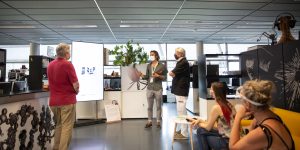Nicolas Naveau
-
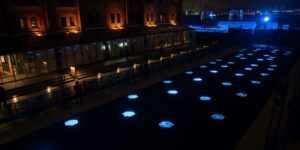
Stream of Hope
Großformatige Fluxels-Performance in Japan
Mit den Fluxels, einem skalierbaren Schwarm von Bodenrobotern, hat das Ars Electronica Futurelab eine neue Form des visuellen Ausdrucks erfunden. Stream of Hope in Osaka und Yokohama stellte die Vielseitigkeit der Roboter bei Großveranstaltungen unter Beweis.
-
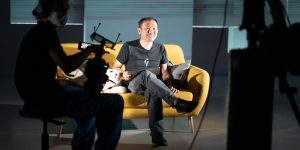
Artistic Journalism 2021
Online-Vorlesung zu sozialem Dialog
2021 hielt Hideaki Ogawa, Artistic Director des Ars Electronica Futurelab, eine Online-Vorlesung an der Keio University SFC (Shonan Fujisawa Campus) zu “Artistic Journalism”, also künstlerischem Journalismus: dem Akt, sozialen Dialog zu schaffen – durch künstlerischen Ausdruck, Forschung, Exploration und Handeln.
-
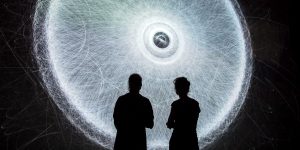
Resonant Media
Ausstellung rund um 8K-Visualisierung
„Resonant Media – Possibilities of 8K Visualization“ verfolgte einen künstlerischen und wissenschaftlichen Ansatz, um die neuen Möglichkeiten von 8K aus verschiedenen Perspektiven zu erkunden. Die Ausstellung in Tokio im Jahr 2021 präsentierte eine Vielzahl von Projekten, die die Zukunft von 8K über den bestehenden Rahmen hinaus erforschten.
-
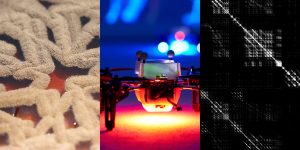
Future Ink
Wo ist meine Seele in der Kreativität?
Das Future Ink Project ist ein Forschungsprojekt rund um die Zukunft der Kreativität unter Berücksichtigung aller Aspekte von Tinte. Im Rahmen von Future Ink wurden verschiedene Prototypen entwickelt, von der Verwendung von Tablets und Drohnen zum Malen bis zur Visualisierung von Gehirnströmen und Körpersignalen als immersive dreidimensionale Tinte.
-
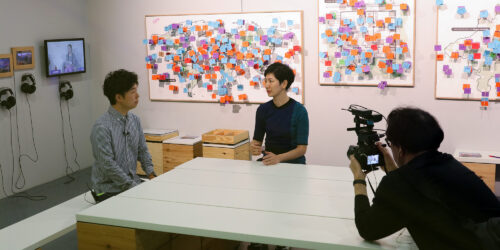
Art Thinking Initiative
Ars Electronica x Hakuhodo
Die Art Thinking Initiative (ATI) ist ein gemeinsames Beratungsprogramm des Ars Electronica Futurelab und Hakuhodo mit dem Ziel, die Methode des Art Thinking in das Management sowie in die Forschung und Entwicklung von Unternehmen, wissenschaftlichen Einrichtungen und öffentlichen Organisationen einzubringen. Hakuhodo ist ein führendes Unternehmen für Kommunikationsdesign und Marketinglösungen in Japan, dessen Kernphilosophie auf „People…
-

Artistic Journalism
Künstlerischer Journalismus ist die Schaffung eines sozialen Dialogs durch künstlerischen Ausdruck, Forschung, Erkundung und Aktion. Um Studierende für diese Methode zu begeistern, unterrichtete Hideaki Ogawa, Co-Direktor des Ars Electronica Futurelab, an der Keio Universität SFC (Shonan Fujisawa Campus) Online-Kurse zum Thema „Artistic Journalism“.
-
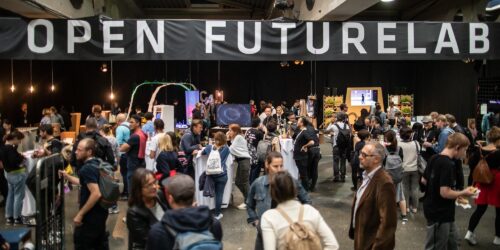
Open Futurelab 2019
Das Festivalgelände der POSTCITY in Linz wurde bis 2019 als Bühne für Open Futurelab genutzt. Der gemeinsam mit der japanischen Rundfunkanstalt NHK entwickelte Media Platz war der Prototyp eines offenen Medienplatzes aus Karton und hochauflösenden Bildschirmen, der als Forum für öffentliche Debatten diente. Dort fanden verschiedene Podiumsdiskussionen statt, u. a. zum Thema „Welche Rolle sollte…
-
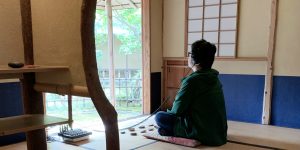
Future Citizen
Matsudo International Science Art Festival 2019
From November 16th to 17th 2019, the Ars Electronica Futurelab contributed to the International Science Art Festival in Matsudo, Japan, for the second time – with an “Ars Electronica Salon” on the theme of “Future Citizen”.
-
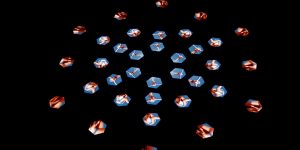
Swarm Arena @Miraikan
In the beginning, there was a shared research interest: How can swarm-based technology be embedded in everyday media use and what new possibilities of communication or artistic expression does it offer as a visual medium? The Japanese telecommunications company NTT and the Ars Electronica Futurelab have been investigating these questions since 2017 and have repeatedly…
-

Jobs of the future in an automated mobility environment
What does our road traffic look like when automation becomes reality? How does a traffic policewoman work in a world where cars drive themselves? What does a driving instructor do when you no longer need a driver’s license?
-

Beyond the Frame – 8K Future Projects
Since 2018, together with Japan’s largest public broadcaster NHK, the Ars Electronica Futurelab has been pursuing questions about the future of the next generation of 8K ultra-high definition TV technology. As early as 2016, NHK began producing 8K material, developing recording and playback technology, and launched the first 8K single channel, making it one of…
